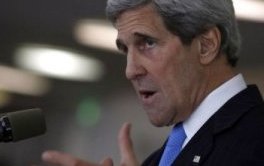US sending its special envoy to S. Sudan to seek end to violence
December 20, 2013 (WASHINGTON) – The United States Secretary of State John Kerry announced that he is sending the special envoy to the Sudans Donald Booth to Juba in order to hold discussions with officials there on ways to end the conflict which has claimed hundreds of lives so far.

“Last night, I called South Sudanese President Kiir and urged him, as president of all of South Sudan, to protect all South Sudanese citizens and work toward reconciliation. We recalled the difficult decisions that led to the remarkable moment when so many stood in long lines for a referendum to give birth to South Sudan, knowing all too well that the toughest decisions were still to come. Now is the time for leadership that makes those decisions through dialogue,” Kerry said in a statement.
“Now is the time for South Sudan’s leaders to rein in armed groups under their control, immediately cease attacks on civilians, and end the chain of retributive violence between different ethnic and political groups. The violence must stop, the dialogue must intensify”.
Foreign ministers from Intergovernmental Authority on Development (IGAD) arrived in Juba today and met with Kiir as part of the regional effort to quell the crisis in the world’s youngest state.
Ethiopia’s Foreign Minister Tedros Ghebreyesus, who was part of the IGAD delegation, told reporters in Juba that they are here “understand the situation first hand” and described the meeting with Kiir as productive.
What began as clashes between different units of South Sudan’s presidential guard in Juba last Sunday, spread to other key places including the states of Jonglei and Unity.
South Sudan president Salva Kiir appeared on Monday to accuse his former deputy Riek Machar and other leading ex-officials of staging a failed coup attempt.
The government arrested ten former ministers and issued an arrest warrant for Machar, former ruling party Sudan People Liberation Movement (SPLM) Secretary General Pagan Amum and ex-governor of Unity state Taban Deng among others.
Machar denied plotting a coup and accused Kiir of using the clashes to get rid of his political opponents. He also rejected Kiir’s offer to sit down for talks unless the latter agrees to step down first.
On Wednesday, the SPLA announced that it lost control of Jonglei state capital of Bor after forces loyal to General Peter Gatdet Yak overran military bases the day before.
Heavy fighting broke out also in Unity state capital of Bentiu but it is unclear who is in control amid conflicting accounts.
The United Mission in South Sudan (UNMISS) said that tens of thousands of civilians have sought refuge at their bases in Juba, Bor and Bentiu.
Juba put the death toll at 500 but it is likely that it will be revised higher. The Indian ambassador at the UN said that three of its peacekeepers were killed in Jonglei.
At least 35, 000 people, the UN said, are currently displaced within its premises in Juba and Jonglei state, with fears of possible rise in numbers as the violence spreads to other parts of the country.
The US top diplomat condemned attacks by militias on UNMISS bases.
“The United States strongly condemns yesterday’s attacks on the United Nations Mission in South Sudan (UNMISS) base in Akobo County in Jonglei State, South Sudan. We offer our condolences to the UN and victims of this attack. We call on all parties to respect UNMISS, to refrain from any attacks on its personnel, and to help facilitate its mission to protect civilians who have sought shelter from the turmoil secure the delivery of humanitarian assistance to all those in need” Kerry said.
Kerry warned that any attempt to take Juba by force will not be condoned by the international community.
“The United States and other partners are committed to the realization of South Sudan’s full political, social, and economic potential, but make no mistake: these cooperative efforts will be undermined if political disputes drag the country back into senseless conflict and strife. Moreover, any armed attack on the capital will be seen as an attempt to achieve an unlawful usurpation of power, which would be universally condemned. Those who seek to take or hold power by violence or division of South Sudanese along ethnic lines will not have our support. Violence today will not pave the way for a more stable or prosperous tomorrow”.
(ST)
